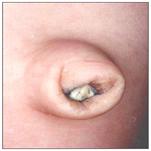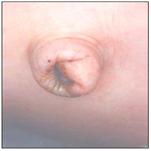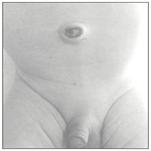신생아 배꼽 염증(신생아의 제염), Neonatal omphalitis(Omphalitis of newborn infants)
| 신생아 배꼽 염증(신생아의 제염)의 원인 |
- 세균이 신새아 배꼽에 감염되어 생겨 신생아 배꼽이 곪은 것을 신생아의 제염 또는 신생아 배꼽 염증이라고 한다.
- 생후 탯줄이 자연적으로 건사되고 그 건사된 배꼽이 다 떨어지기 전 탯줄이 붙어 있는 배꼽에 화농성 세균(박테리아) 감염이 생겨 배꼽에 염증이 생길 수 있다.
- 탯줄이 배꼽에서 떨어진 후 배꼽에 화농성 박테리아가 감염 되어 화농성 염증이 배꼽에 생길 수도 있다.
- 그외 배꼽에 붙은 탯줄이 떨이지기 전에 탯줄과 배꼽에 물을 묻히거나 탯줄을 불결하게 처치했을 때 배꼽 염증이 생길 수 있다(배꼽과 탯줄 참조).
| 신생아 배꼽 염증(신생아의 제염)의 증상 징후 |
- 제염을 일으킨 세균(박테리아)의 종류, 제염의 정도에 따라 증상 징후가 다르다.
- 배꼽이 곪았을 때는 배꼽에서 누런 고름 및, 또는 피가 조금 날 수 있고 때로는 악취가 난다.
- 탯줄이 연결되어 있는 배꼽의 주위의 피부가 빨갛고 부을 수 있다.
- 제염을 적절히 치료하지 않으면 제염을 일으킨 박테리아가 제대혈관을 통해 간과 전신에 퍼져 패혈증 등 합병증이 생길 수 있다.
| 신생아 배꼽 염증(신생아의 제염)의 진단 |
- 병력 증상 징후 진찰소견 등을 종합해서 진단한다.
- 제염에서 고름을 채취해서 세균배양 검사를 해서 어떤 세균이 제염을 일으켰는지 알아보면서 그 검사의 결과에 따라 치료할 수 있다.

사진 2-301. 신생아 제염으로 배꼽이 붓고 배꼽의 중앙에 고름이 있다. 배꼽 허니아가 있다.
Copyright ⓒ 2011 John Sangwon Lee, MD., FAAP

사진 2-302. 신생아 제염으로 배꼽이 붓고 배꼽에 경도의 배꼽 허니아도 있다. 제염도 있고 배꼽에서 출혈도 있다
Copyright ⓒ 2011 John Sangwon Lee, MD., FAAP

사진 2-303. 신생아 제염으로 배꼽이 조금 부었다.
Copyright ⓒ 2011 John Sangwon Lee, MD., FAAP
| 신생아 배꼽 염증(신생아의 제염)의 치료 |
- 제염이 아주 경미할 때는 의사의 처방에 따라 네오스포린이나 배시트라신 등 항생제 연고 국소도포로 치료한다.
- 1일 4~6회, 10일 간 제염에 발라 치료하기도 한다.
- 그렇지만 제염과 패혈증이 동시 있다고 의심되거나 확진되면 적절한 항생제 혈관 주사 치료를 한다. 미열 내지 고열이 나고 제염의 증상 징후가 심하면 병원에 입원 항생제 주사 치료를 해야 한다.
- 출생 후 배꼽에 붙은 탯줄이 다 말라 떨어질 때까지 베타다인 살균액제로 배꼽과 탯줄을 매일 살균처리해서 박테리아 감염이 배꼽에 생기지 않도록 해서 제염을 예방해야 한다.
- 탯줄이 말라 떨어지기 전까지 신생아를 목욕시킬 때는 탯줄과 배꼽에 물이 묻지 않도록 주의 한다.
- 탯줄이 배꼽에 붙어 있을 때는 기저귀나 거즈 등으로 배꼽을 덮어 주지 않는 것이 좋다. 그래야 탯줄이 더 빨리 말라 떨어진다.
Q&A. 신생아 콧물제거와 배꼽염증
다음은 배꼽 염증(제염)에 관한 소아 건강상담 질의응답의 예 1 입니다.
Q. 신생아 콧물제거와 배꼽염증
산후조리원에서 아이와 2주를 지냈습니다. 탯줄은 일주일 만에 떨어졌는데 며칠 뒤에 보니까 염증이 생긴 것 같아 간호사에게 소독을 부탁했습니다. 걱정하지 말라고 하며 며칠 있으면 없어진다고 했는데 차도가 보이지 않습니다. 현재 약솜으로 목욕 후에 한 번 씩 소독하고 있습니다.
어떻게 해야 하나요? 아이랑 그저께 집에 왔는데 어제 보니 코에 코딱지가 끼어 숨도 제대로 못 쉬고 있어서 식염수를 면봉에 묻혀 빼주었습니다.
식염수를 묻혀 면봉으로 계속 닦아내도 괜찮은지요. 답변 부탁드립니다.
A.
성에님께, 안녕하세요. 질문해 주셔서 감사합니다. 좋은 질문입니다.
자녀의 나이, 성별, 과거 병력, 가족 병력, 진찰소견, 임상검사 등의 정보를 많이 알수록 답을 드리는데 도움이 됩니다. 주신 정보를 토대로 해서 답변을 드리겠습니다.
배꼽에 감염병(배꼽 염증)도 생길 수 있고 배꼽에 제육아종이 생겨 있을 수 있고 그로 인해 냄새도 나고 진물과 피도 날 수 있습니다.
약국에서 항생제 연고를 사서 발라 주시고 베타다인 살균액제로 치료할 수 있지만 그런 치료를 하기 전에 소아청소년과에서 검진을 받고 치료받으시기 바랍니다.
신생아의 코가 막히는 원인은 알레르기 비염, 감기, 박테리아 비염, 혈관 운동성 비염, 또는 선천성 비강 내 기형 등으로 코가 막힐 수 있습니다.
진찰을 하지 않고 무엇 때문에 코가 막히는지 잘 모르고 식염수를 비강 속에 넣어 치료하는 것은 이상적인 치료 방법이 아닙니다.
비강 내 넣는 식염수 방울약이 있기는 하지만 비강 내 분비물이 딱딱하게 굳어 코딱지가 콧구멍이나 비강 속에서 쉽게 떨어져 나오도록 치료 할 때 식염수 방울약을 가끔 사용할 수 있습니다.
요즘 비강 내에 살포하는 생리 식염수 분무제도 있습니다. 그러나 신생아에게는 쓰지 않는 것이 좋을 것입니다.
이 문제에 대해서도 소아청소년과에서 진찰 진단을 받으시기 바랍니다. 배꼽 염증(제염),
제육아종, 감기를 참조하시기 바랍니다. 질문이 더 있으면 다시 연락해 주시기 바랍니다.
감사합니다. 이상원 드림
Neonatal omphalitis (Omphalitis of newborn infants)
Causes
• Infection of the navel of a newborn baby due to bacterial infection in the navel of the newborn is called decontamination of the newborn or inflammation of the navel of a newborn.
• After birth, the umbilical cord is naturally dry and before the dried umbilical cord is worn out, a purulent bacterial (bacterial) infection may occur in the umbilical cord attached to the umbilical cord, causing inflammation of the umbilical cord.
• After the umbilical cord falls off the navel, purulent bacteria may infect the navel, causing purulent inflammation in the navel.
• Inflammation of the umbilical cord can also occur if the umbilical cord and umbilical cord are wetted with water or treated uncleanly before the umbilical cord attached to the navel falls off (see Navel and Umbilical Cord).
Signs, Symptoms
• Symptoms differ depending on the type of bacteria (bacteria) that caused the decontamination and the degree of decontamination. • When the navel is swollen, there may be a little yellow pus and/or blood from the navel, and sometimes there is a bad smell.
• The skin around the navel, where the umbilical cord is connected, may be red and swollen.
• If decontamination is not properly treated, the bacteria that caused decontamination can spread to the liver and the whole body through the umbilical cord blood vessels, leading to complications such as sepsis.
Diagnosis of neonatal belly button inflammation
• Diagnosis is made by combining medical history, symptoms, signs, and examination findings.
• You can collect pus from decontamination and perform a bacterial culture test to find out which bacteria caused the decontamination, and treatment can be performed according to the results of the test.

Picture 2-301. The navel is swollen due to decontamination of the newborn, and there is pus in the center of the navel. I have umbilical hernia. Copyright ⓒ 2011 John Sangwon Lee, MD., FAAP

Picture 2-302. The navel is swollen due to decontamination of newborns, and there is also a mild umbilical hernia in the navel. There is decontamination and there is bleeding from the navel. Copyright ⓒ 2011 John Sangwon Lee, MD., FAAP

Picture 2-303. The navel was slightly swollen due to decontamination of the newborn. Copyright ⓒ 2011 John Sangwon Lee, MD., FAAP
Treatment of neonatal belly button inflammation
• If the decontamination is very mild, according to the doctor’s prescription, apply topical antibiotic ointment such as neosporin or bacitracin.
• It is sometimes treated by applying decontamination 4 to 6 times a day for 10 days
• However, if decontamination and sepsis are suspected or confirmed at the same time, appropriate antibiotic vascular injection should be administered. If you have mild or high fever and the symptoms of decontamination are severe, you should be hospitalized and treated with antibiotics.
• After birth, the umbilical cord and umbilical cord should be sterilized daily with betadyne antiseptic solution until the umbilical cord attached to the navel dries out to prevent bacterial infection from forming in the navel to prevent decontamination.
• When bathing a newborn baby until the umbilical cord is dry, be careful not to get water on the umbilical cord and navel.
• When the umbilical cord is attached to the navel, it is better not to cover the navel with diapers or gauze. This will cause the umbilical cord to dry faster and fall off.
Q&A. Newborn rhinorrhea and umbilical cord inflammation
The following is Example 1 of Q&A for pediatric health consultation regarding inflammation of the umbilicus (inflammation).
Q. Removal of runny nose and inflammation of the umbilicus in newborns I spent 2 weeks with my child at the postpartum care center. The umbilical cord fell off in a week, but after a few days, it looked like it was inflamed, so I asked the nurse to disinfect it. They told me not to worry and they said it would go away in a few days, but I can’t see any improvement. Currently, I am disinfecting once after bathing with a cotton pad. What should I do?
I came home with my child the day before yesterday, and yesterday I found that she had a snot in her nose and could not breathe properly. Is it okay for her to continue wiping with a cotton swab dipped in saline? please answer about my question.
A. Hello, Sung. Thanks for asking. That’s a good question. The more information you know about your child’s age, gender, past medical history, family history, examination findings, and clinical tests, the more helpful it is to give you an answer. We will give you an answer based on the information you provided.
The navel may also develop an infection (inflammation of the navel) and may have granulomas on the navel, which may cause an odor, discharge, and blood. You can buy an antibiotic ointment from a pharmacy and apply it, and it can be treated with betadyne sterilizing solution. Nasal congestion in newborns can be caused by allergic rhinitis, colds, bacterial rhinitis, vasomotor rhinitis, or congenital malformations in the nasal passages.
It is not an ideal treatment method to put a saline solution into the nasal passages without an examination and not knowing what is causing the stuffy nose.
Although intranasal saline drops are available, saline drops are sometimes used to treat nasal secretions that harden and cause snot to come off easily in the nostrils or nasal passages. There are also saline sprays that are administered intranasally these days. But it would be better not to use it for newborns.
Please see the Pediatrics Department for a diagnosis on this issue as well. Inflammation of the navel (inflammation), See also granulomatosis, cold. If you have any further questions, please contact us again. thank you. Lee Sang-won Dream
출처 및 참조 문헌 Sources and references
- NelsonTextbook of Pediatrics 22ND Ed
- The Harriet Lane Handbook 22ND Ed
- Growth and development of the children
- Red Book 32nd Ed 2021-2024
- Neonatal Resuscitation, American Academy Pediatrics
- www.drleepediatrics.com 제1권 소아청소년 응급 의료
- www.drleepediatrics.com 제2권 소아청소년 예방
- www.drleepediatrics.com 제3권 소아청소년 성장 발육 육아
- www.drleepediatrics.com 제4권 모유,모유수유, 이유
- www.drleepediatrics.com 제5권 인공영양, 우유, 이유식, 비타민, 미네랄, 단백질, 탄수화물, 지방
- www.drleepediatrics.com 제6권 신생아 성장 발육 육아 질병
- www.drleepediatrics.com제7권 소아청소년 감염병
- www.drleepediatrics.com제8권 소아청소년 호흡기 질환
- www.drleepediatrics.com제9권 소아청소년 소화기 질환
- www.drleepediatrics.com제10권. 소아청소년 신장 비뇨 생식기 질환
- www.drleepediatrics.com제11권. 소아청소년 심장 혈관계 질환
- www.drleepediatrics.com제12권. 소아청소년 신경 정신 질환, 행동 수면 문제
- www.drleepediatrics.com제13권. 소아청소년 혈액, 림프, 종양 질환
- www.drleepediatrics.com제14권. 소아청소년 내분비, 유전, 염색체, 대사, 희귀병
- www.drleepediatrics.com제15권. 소아청소년 알레르기, 자가 면역질환
- www.drleepediatrics.com제16권. 소아청소년 정형외과 질환
- www.drleepediatrics.com제17권. 소아청소년 피부 질환
- www.drleepediatrics.com제18권. 소아청소년 이비인후(귀 코 인두 후두) 질환
- www.drleepediatrics.com제19권. 소아청소년 안과 (눈)질환
- www.drleepediatrics.com 제20권 소아청소년 이 (치아)질환
- www.drleepediatrics.com 제21권 소아청소년 가정 학교 간호
- www.drleepediatrics.com 제22권 아들 딸 이렇게 사랑해 키우세요
- www.drleepediatrics.com 제23권 사춘기 아이들의 성장 발육 질병
- www.drleepediatrics.com 제24권 소아청소년 성교육
- www.drleepediatrics.com 제25권 임신, 분만, 출산, 신생아 돌보기
- Red book 29th-31st edition 2021
- Nelson Text Book of Pediatrics 19th- 21st Edition
- The Johns Hopkins Hospital, The Harriet Lane Handbook, 22nd edition
- 응급환자관리 정담미디어
- Pediatric Nutritional Handbook American Academy of Pediatrics
- 소아가정간호백과–부모도 반의사가 되어야 한다, 이상원 저
- The pregnancy Bible. By Joan stone, MD. Keith Eddleman, MD
- Neonatology Jeffrey J. Pomerance, C. Joan Richardson
- Preparation for Birth. Beverly Savage and Dianna Smith
- 임신에서 신생아 돌보기까지. 이상원
- Breastfeeding. by Ruth Lawrence and Robert Lawrence
- Sources and references on Growth, Development, Cares, and Diseases of Newborn Infants
- Emergency Medical Service for Children, By Ross Lab. May 1989. p.10
- Emergency care, Harvey Grant and Robert Murray
- Emergency Care Transportation of Sick and Injured American Academy of Orthopaedic Surgeons
- Emergency Pediatrics A Guide to Ambulatory Care, Roger M. Barkin, Peter Rosen
- Quick Reference To Pediatric Emergencies, Delmer J. Pascoe, M.D., Moses Grossman, M.D. with 26 contributors
- Neonatal resuscitation Ameican academy of pediatrics
- Pediatric Nutritional Handbook American Academy of Pediatrics
- Pediatric Resuscitation Pediatric Clinics of North America, Stephen M. Schexnayder, M.D.
-
Pediatric Critical Care, Pediatric Clinics of North America, James P. Orlowski, M.D.
-
Preparation for Birth. Beverly Savage and Dianna Smith
-
Infectious disease of children, Saul Krugman, Samuel L Katz, Ann A.
- 제4권 모유, 모유수유, 이유 참조문헌 및 출처
- 제5권 인공영양, 우유, 이유, 비타민, 단백질, 지방 탄수 화물 참조문헌 및 출처
- 제6권 신생아 성장발육 양호 질병 참조문헌 및 출처
- 소아과학 대한교과서
Copyright ⓒ 2014 John Sangwon Lee, MD., FAAP
“부모도 반의사가 되어야 한다”-내용은 여러분들의 의사로부터 얻은 정보와 진료를 대신할 수 없습니다.
“The information contained in this publication should not be used as a substitute for the medical care and advice of your doctor. There may be variations in treatment that your doctor may recommend based on individual facts and circumstances.
“Parental education is the best medicine.